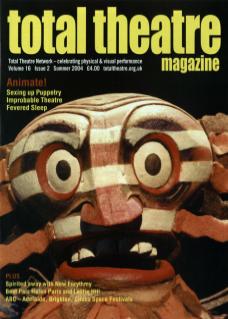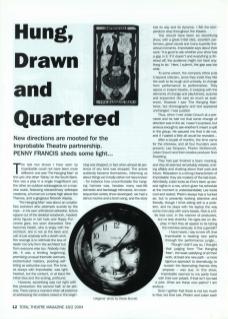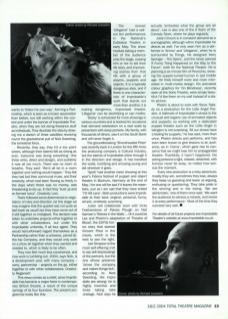The last two shows I have seen by Improbable could not have been more different: one was The Hanging Man at the Lyric, the other Sticky on the South Bank. One was a play in a single magnificent set; the other an outdoor extravaganza on a massive scale, featuring extraordinary sellotape creations, a human on a crane high above the Thames, and a gorgeous firework display.
The Hanging Man was about an unsatisfied architect who attempts suicide by the rope – in his own unfinished cathedral. Actors appear out of the skeletal woodwork, masked white figures in tall hats and floppy Pulcinella garb, too soon discarded. One becomes Death, who is angry with the architect: she is not at the beck and call of just anybody with a death wish. Her revenge is to withhold the kiss of death not only from the architect but from everyone else too. Nobody may die. It was a thrilling beginning, promising unusual thematic avenues, existentialist matters, positing self-killing as seductive cop-out. The tone, as always with Improbable, was light-hearted, but the content, or at least the initial idea and the ending, profound.
However, something was not right with this production: the second half, to be precise. There came a moment when all pretence at addressing the matters raised in the beginning was dropped, in fact when almost all pretence of any kind was dropped. The actors suddenly became themselves, informing us about things we'd really rather not have known – for instance how uncomfortable the hanging harness was, besides many real-life domestic and backstage intimacies. An inconsequential variety show developed: we had a dance routine and a torch song, and the story lost its way and its dynamic. I felt the temperature drop throughout the theatre.
This should have been an electrifying show, with a great initial idea, excellent performers, great visuals and many superbly theatrical moments. Improbable says about their work: 'It is good to ask whether your show has a gap in it. If it doesn't and everything is finished off, the audience might not have anything to do.' Here, I submit, the gap was too wide.
To some extent, the company ethos puts it beyond criticism, since they insist they like the work to be rough and unready, to change from performance to performance. They rejoice in instant theatre, in keeping with the elements of change and playfulness, surprise and enjoyment (for cast as much as audience). However I saw The Hanging Man twice, but choreography and text appeared unchanged. I was puzzled.
Thus, when I met Julian Crouch at a premiere and he told me that some change of direction was in the air, I wasn't surprised, but anxious enough to ask whether it meant a split in the group. He assured me that it did not, and if I waited a little all would be revealed...
After a couple of months, the time came for the interview, and all four founders were present: Lee Simpson, Phelim McDermott, Julian Crouch and their creative producer Nick Sweeting.
They had just finished a team meeting, and they all seemed remarkably relaxed, smiling affably and chatting about their past and future. Relaxation is a strong characteristic of Improbable: they are masters of the laid-back. Admittedly, Julian looks as if he's been up several nights in a row, which given his schedule at the moment is understandable; Lee looks cool and rested; Phelim always has a hunted air, but is presently looking attentive and friendly, though I think sitting still is a problem, and he plays with his laptop the way some men play with worry beads. Nick is a little less cool, in the manner of producers, but no less cheerful. No egos are on display, in fact they all appear to be taking the interview seriously. Is this a gambit?
I have heard, I say to kick off, that Improbable is beating new paths through the performance jungle...
Though I didn't say so, I thought that judging from The Hanging Man, the least satisfying of all their work, at least one new path – a more rigorous approach to dramaturgy, to sustain the fascinating themes they propose – was due. In this show, Improbable seemed to me partly hoist with their own petard, if that isn't too bad a joke. What are these new paths? I am anxious.
Soon I gather that there is not too much to fear, but that Lee, Phelim and Julian each wants to ‘follow his own way', forming a Partnership, which is seen as a looser association than before, but still working within the context and under the banner of Improbable Theatre, when they are not doing freelance stuff as individuals. They illustrate the idea by drawing me a sketch of three satellites revolving round the gravitational pull of Nick Sweeting, the terrestrial force.
Recently, they say, they hit a low point where, although their talents felt as strong as ever, 'everyone was doing everything' (the three write, direct and design), and suddenly it was all too much. There was no room to breathe. They said: 'We'd all be in a room together and nothing would happen.' They felt they had lost their communal muse, and their creativity, which had been flowing so freely in the days when there was no money, was threatening to dry up. In fact they 'bust up and re-formed twice'. Creativity Lost.
There followed some determined re-negotiation of roles and direction (at this stage we may imagine that the quartet was not quite as laid-back as usual) but they have come out of it still together, re-energised. The decision was taken to undertake projects either together or with other collaborators, but under the Improbable umbrella, if all four agree. They would henceforward regard themselves as a Partnership rather than a cohesive, joined-at-the-hip Company, and they would only work on a show all together when they wanted and needed to, which is likely to be often.
They now feel much less constrained, and new work is tumbling out. 2004, says Nick, is a development year, with many company – sorry, partnership – projects on the go, either together or with other collaborators. Creativity Regained!
This news comes as a relief, since Improbable has become a major force in contemporary British theatre, a result of the unique synergy of its four founders. The present programme looks like this:
The revived Lifegame had a sellout ten performances in the National's Cottesloe Theatre in early May. The show involves taking a member of the audience onto the stage, coaxing him or her to tell their life story, and improvising scenes from that life with a group of players, puppets and objects. It is a typically dangerous idea, and if there is one characteristic of Improbable's work that stands out more than another, it is making dangerous, improvised theatre. Lifegame can be electrifying or can misfire.
Sticky is scheduled for more showings in various countries and is booked for Occasions that demand celebration on a vast scale by presenters with deep pockets. My family, with thousands of others, saw it on the South Bank and will never forget it.
The groundbreaking Shockheaded Peter was recently back in London for the fifth time; the producing company is Cultural Industry, but the talents of Improbable shine through it in the direction and design. It has travelled the world, horrifying and amusing young and old wherever it goes.
Spirit had another (rare) showing at this year's Fidena festival of puppet and object theatre in Bochum, Germany at the end of May. I for one will be sad if it leaves the repertoire, just as I am sad that they have ended 70 Hill Lane. Both productions were Improbable at their best: original, personal, funny, simple, endlessly surprising.
Julian will collaborate soon with Vicky Featherstone of Paines Plough on Neil Gaiman's Wolves in the Walls... Or it could be Lee and Phelim's adaptation of Theatre of Blood, the 1970s horror story that starred Vincent Price in the movie, which is the next to see the light.
Lee Simpson is the most self-effacing (not to say self-deprecating) of the partners, but the one whose presence 'drives the company and makes things tick', according to Nick Sweeting. His impro skills are strong; he is highly inventive and loves taking risks onstage. Nick says he actually ‘embodies what the group are all about’. Lee is also one of the A Team of the Comedy Store, where he plays regularly.
Julian Crouch is in constant demand as a scenographer, although within Improbable he directs as well. I've only seen him as a performer in Animo and Lifegame, when he is surrounded by Things. He designed Jerry Springer - The Opera, and the newly opened A Funny Thing Happened on the way to the Forum, both for the National Theatre. He is planning a six-minute film of Pinocchio, showing the puppet-turned-human in sad middle age. He finds himself more and more interested in multimedia design. His animated colour graphics for On Blindness, recently seen at the Soho Theatre, were simply beautiful: I'd like them on my wall instead of a static picture.
Phelim is about to work with Steve Tiplady on a production for the Little Angel Theatre. A hallmark of Improbable's shows is the unusual and organic use of animated objects and puppets; so working with a dedicated puppet theatre such as the Little Angel in Islington is not surprising. ‘All our shows have a feeling for puppets,' he has said, more than once. Phelim directs and performs, and has even been known to give lessons to an audience, as in Coma, which gave rise to concerns that we might lose him to propagandist theatre. Thankfully, it hasn't happened. His acting persona is light, relaxed, detached, with humour never far away, no matter how serious the moment.
Every new production is a risky adventure: mostly they win, sometimes they lose, always they keep us guessing and leave us arguing, enthusing or questioning. They take pride in the winning and in the losing. ‘We are alchemists,’ one of them once said. ‘We want the audience to witness a miracle, and renew it at every performance.' Most of the time they succeed very well.
For details of all future projects see Improbable Theatre's website at www.improbable.co.uk


